Related Research Articles
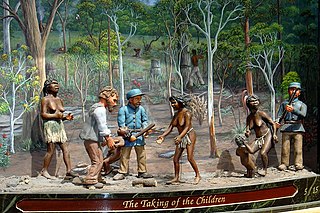
The Stolen Generations were the children of Australian Aboriginal and Torres Strait Islander descent who were removed from their families by the Australian federal and state government agencies and church missions, under acts of their respective parliaments. The removals of those referred to as "half-caste" children were conducted in the period between approximately 1905 and 1967, although in some places mixed-race children were still being taken into the 1970s.

The Aboriginal and Torres Strait Islander Commission (ATSIC) (1990–2005) was the Australian Government body through which Aboriginal Australians and Torres Strait Islanders were formally involved in the processes of government affecting their lives, established under the Hawke government in 1990. A number of Indigenous programs and organisations fell under the overall umbrella of ATSIC.

Lowitja Lois O'Donoghue Smart, is an Aboriginal Australian retired public administrator. In 1990-1996 she was the inaugural chairperson of the Aboriginal and Torres Strait Islander Commission (ATSIC). She is patron of the Lowitja Institute, a research institute for Aboriginal & Torres Strait Islander health and wellbeing.
The Select Committee on Reserves Bill 2003 is an Australian select committee that investigated the eviction of the Swan Valley Nyungah Community (SVNC) from their traditional land through the use of the Reserves Bill 2003. It investigated the motives of the Western Australian Gallop government in proposing and passing the bill.

The Swan Valley Nyungah (Noongar) Community was an Aboriginal community of Noongar people at Lord Street, in the outer Perth suburbs of Lockridge and Eden Hill in Western Australia.
Geoff Clark is an Australian Aboriginal politician and activist. Clark led the Aboriginal and Torres Strait Islander Commission (ATSIC) from 1999 until it was effectively disbanded in 2004.
An outstation, homeland or homeland community is a very small, often remote, permanent community of Aboriginal Australian people connected by kinship, on land that often, but not always, has social, cultural or economic significance to them, as traditional land. The outstation movement or homeland movement refers to the voluntary relocation of Aboriginal people from towns to these locations.

Linda Jean Burney is an Australian politician and is an Australian Labor Party member of the Australian House of Representatives, representing Barton since the 2016 federal election. She is Minister for Indigenous Australians in the Albanese ministry, and the first woman who identifies as Aboriginal to serve in that position.
The Bennelong Society was a conservative think-tank dedicated to Indigenous Australian affairs. The society was named after the Eora man, Bennelong, who served as an interlocutor between the Indigenous Australian and British cultures, both in Sydney and in the United Kingdom almost from the start of British settlement of Australia in 1788. It was affiliated with conservative commentators in debates on Indigenous affairs. The society was established to:
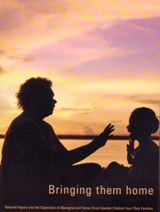
Bringing Them Home is the 1997 Australian Report of the National Inquiry into the Separation of Aboriginal and Torres Strait Islander Children from Their Families. The report marked a pivotal moment in the controversy that has come to be known as the Stolen Generations.

Katherine Mary ClutterbuckCSC MBE, usually known as Sister Kate, was an Anglican nun who pioneered a cottage home system for looking after orphan babies and children in Western Australia. She later became well known for her work with Indigenous Australian children who were selected according to a criterion of skin colour and sent to her homes to groom the young "nearly white" children for absorption into the white community. These children would later be described as part of the Stolen Generation.
The National Indigenous Council (NIC) was an appointed advisory body to the Australian Government through the Minister's for Indigenous Affairs' Taskforce on Indigenous Affairs (MTIA) established in November 2004, and wound up in early 2008. It was chaired by Sue Gordon, a Western Australian magistrate.
Alison Nampitjinpa Anderson is an Australian politician.
Little Children are Sacred, or Ampe Akelyernemane Meke Mekarle, is the report of a Board of Inquiry into the Protection of Aboriginal Children from Sexual Abuse, chaired by Rex Wild and Patricia Anderson. Commissioned by the government of the Northern Territory, Australia, the report was publicly released on 15 June 2007.
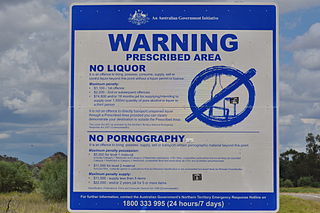
The Northern Territory National Emergency Response, also known as "The Intervention" or the Northern Territory Intervention, and sometimes the abbreviation "NTER" was a package of measures enforced by legislation affecting Indigenous Australians in the Northern Territory (NT) of Australia, which lasted from 2007 until 2012. The measures included restrictions on the consumption of alcohol and pornography, changes to welfare payments, and changes to the delivery and management of education, employment and health services in the Territory.
This is a timeline of Aboriginal history of Western Australia.
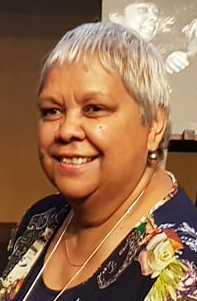
Jacqueline Gail "Jackie" Huggins is an Aboriginal Australian author, historian, academic and advocate for the rights of Indigenous Australians. She is a Bidjara/Pitjara, Birri Gubba and Juru woman from Queensland.
Forgotten Australians or care leavers are terms referring to the estimated 500,000 children who experienced care in institutions or outside a home setting in Australia during the 20th century. The Australian Senate committee used the term in the title of its report which resulted from its 2003–2004 "Inquiry into Children in Institutional Care", which looked primarily at those affected children who were not covered by the 1997 Bringing Them Home report, which focused on Aboriginal children, and the 2001 report Lost Innocents: Righting the Record which reported on an inquiry into child migrants.
Indigenous Australians are both convicted of crimes and imprisoned at a disproportionately higher rate in Australia, as well as being over-represented as victims of crime. As of September 2019, Aboriginal and Torres Strait Islander prisoners represented 28% of the total adult prisoner population, while accounting for 2% of the general adult population. Various explanations have been given for this over-representation, both historical and more recent. Federal and state governments and Indigenous groups have responded with various analyses, programs and measures.
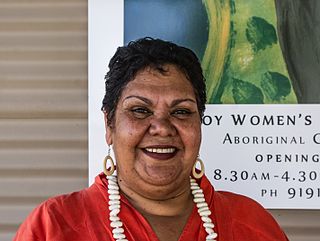
June Oscar is an Australian Aboriginal woman of Bunuba descent, Indigenous rights activist, community health and welfare worker, film and theatre, and since 2017 and as of February 2022 Aboriginal and Torres Strait Islander Social Justice Commissioner.
References
Citations
- 1 2 3 "Dr Sue Gordon AM". UWA, Centre for the Advancement of Teaching and Learning, Teaching and Learning Forum 2006. Retrieved 30 April 2007.
- ↑ "Keynote Speaker: Sue Gordon". Australasian Conference on Child Abuse and Neglect. Archived from the original on 20 March 2007. Retrieved 28 April 2007.
- 1 2 Gordon, Sue; Hallahan, Kay; Henry, Darrell (31 July 2002). Putting the picture together: Inquiry into response by government agencies to complaints of family violence and child abuse in Aboriginal communities (PDF). Western Australian Government. Dept of Premier and Cabinet. Retrieved 11 October 2019.
- ↑ "The Gordon Inquiry". Department of the Premier and Cabinet. 2 May 2005. Retrieved 30 April 2007.
- ↑ "National Indigenous Council". Minister Assisting the Prime Minister for Indigenous Affairs. 21 June 2007. Archived from the original on 10 May 2007. Retrieved 30 April 2007.
- ↑ O'Donnell, Mick (7 December 2004). "Indigenous Council head speaks out". Australian Broadcasting Corporation . Retrieved 28 April 2007.
- ↑ Department of Aboriginal Affairs Website (16 April 2010). "Indigenous Implementation Board membership". Archived from the original on 4 March 2014. Retrieved 19 June 2013.
- ↑ Board & CEO, Jawun, archived from the original on 9 February 2011
- ↑ Our Board at WA YPC, 2017
- ↑ "No new Stolen Generation, says Aboriginal magistrate". The West Australian. 8 February 2018. Retrieved 5 April 2018.
- ↑ "The Graham (Polly) Farmer Foundation". The Graham (Polly) Farmer Foundation. Retrieved 5 April 2018.
- ↑ "'Rowen, Jasmine and 2000 others follow the dream', Page 5, The Australian, 31 March 2018". www.theaustralian.com.au. Retrieved 5 April 2018.
Other sources
- Emerson, Daniel (28 April 2007). "Blessed is the Peacemaker". The West Australian . Society liftout, pp 6–7.
- Dorante, Karen (27 October 2002). "Sue Gordon" . Retrieved 28 April 2007.
- "Children's Court". Department of the Attorney General (Western Australia). Retrieved 2 May 2007.
- ""Lunch with Sue Gordon", by Ellen Fanning". The Bulletin (10 August 2007), pp 26–29. Retrieved 1 November 2007.